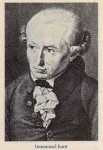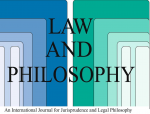Listing of talks and papers from 2013.
On Property Theory
This paper is an introduction to property theory including the invisible hand mechanism which handles the initiation and termination of property rights in an on-going private property market economy. The Fundamental Theorem is that when Hume’s conditions of no involuntary transfers and no breached contracts are fulfilled, then the Lockean principle of people getting the fruits of their labor, i.e., imputing legal responsibility in accordance with de facto responsibility is satisfied. The major application is to the current system of a private property market economy based on the renting of persons, i.e., the employment contract.
This is a reprint of the paper in the Journal of Economic Issues in Sept. 2014.
Kantian Personhood Principle
This paper formulates the labor theory of property and democratic theory in the context of the Kantian personhood principle to treat other persons always as ends in themselves and never simply as means.
Property and Contract in Economics: The Case for Economic Democracy
This book presents a modern version of the old Labor (or Natural Rights) Theory of Property and of an Inalienable Rights Theory that descends from the Reformation and Enlightenment. Together these theories re-solve the basic problem of distribution in the sense of giving a basis for the just appropriation of property and a basis for answering the question of who is to be the firm, e.g., the suppliers of share capital as in conventional capital, the government as in socialism, or the people who work in the firm as in the system of economic democracy (or labor-managed market economies).
Inalienable Rights: A Litmus Test for Liberal Theories of Justice
This paper published in the European journal, Law and Philosophy, examines the intellectual history of inalienable rights theory, and critically examines the work of liberal philosophers of justice, John Rawls and Robert Nozick, from that perspective.
Introduction to Property Theory
This is yet another unpublished paper to introduce property theory to various audiences, particularly economists.
The Libertarian Case for Slavery: A Note on Nozick
This is a historically important paper, by one “J. Philmore,” arguing along with Robert Nozick from a free-market libertarian viewpoint that the self-sale contract and the current employment or self-rental contract are on the same moral footing.
Translatio versus Concessio: Retrieving the debate about contracts of alienation with an application to today’s employment contract
Liberal thought is based on the fundamental question of consent versus coercion. The autocracies and slavery systems of the past were based on coercion whereas today’s democracy in the political sphere and employment system in the economy are based on consent. This paper retrieves an almost forgotten contractarian tradition, dating from at least the Middle Ages, that based political autocracy and economic slavery on explicit or implicit voluntary contracts. Hence the democratic and antislavery movements had to hammer out arguments not simply in favor of consent and against coercion, but arguments based on the distinction between contracts to alienate (translatio) sovereignty versus contracts to only delegate (concessio) self-governance rights.
On Rawls and Nussbaum
This paper was delivered at a 2008 conference in Leuven on Martha Nussbaum’s book Frontiers of Justice. The paper was to be published in the conference proceedings, but somehow that never happened.
Employment Contract and Liberal Thought
This was the first of several papers that focused on the employment contract and inalienable rights, rather than on the labor theory of property.






